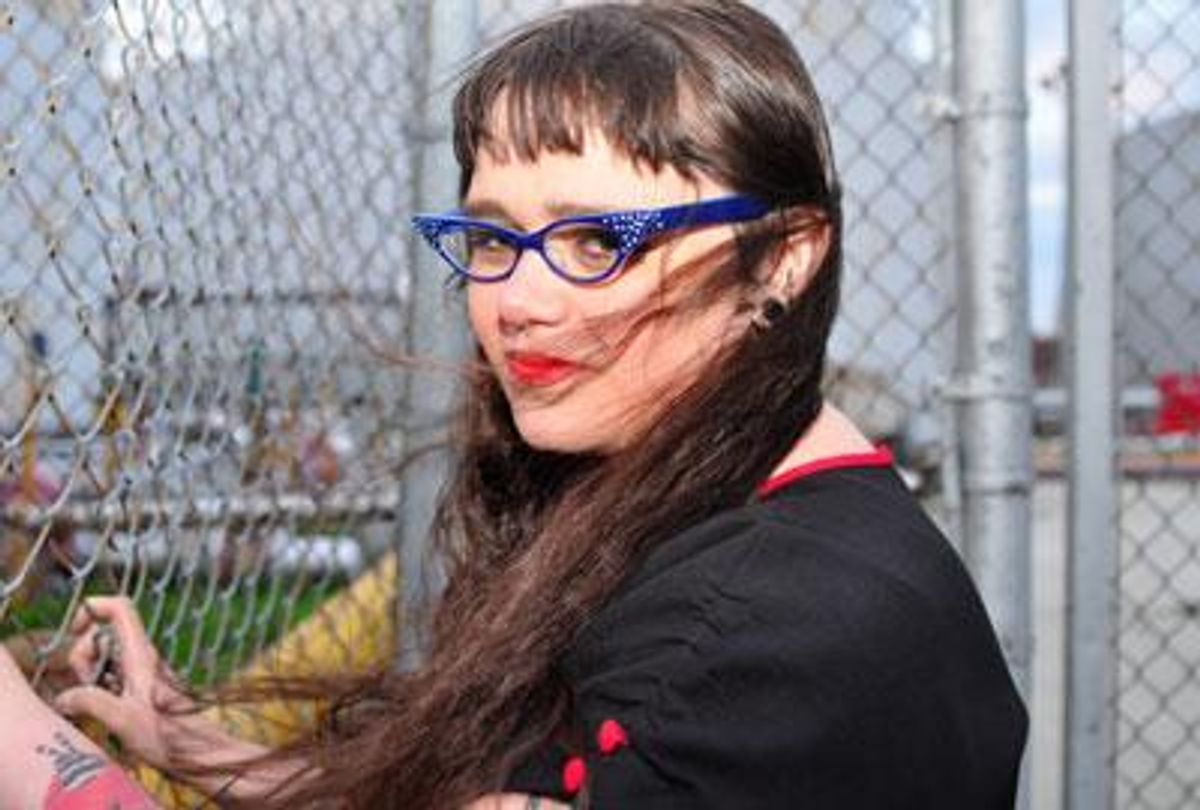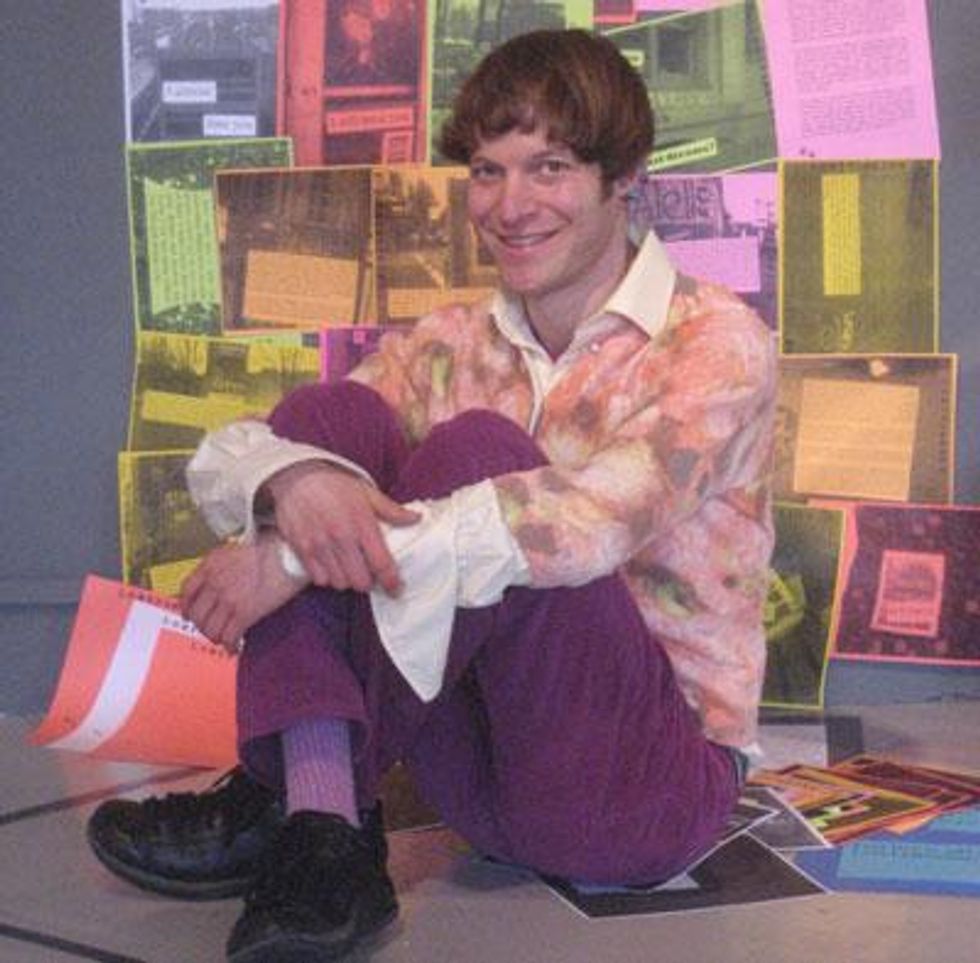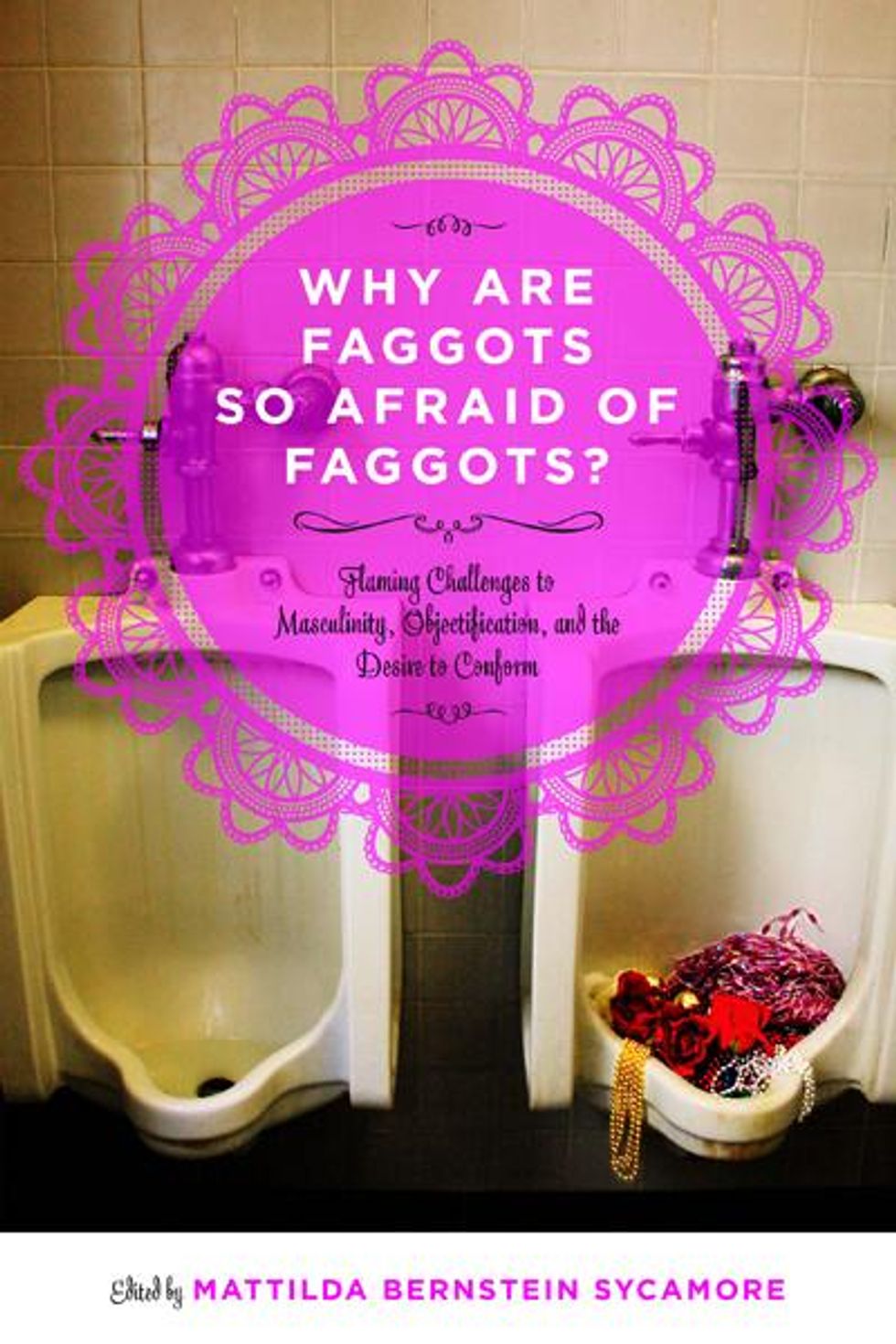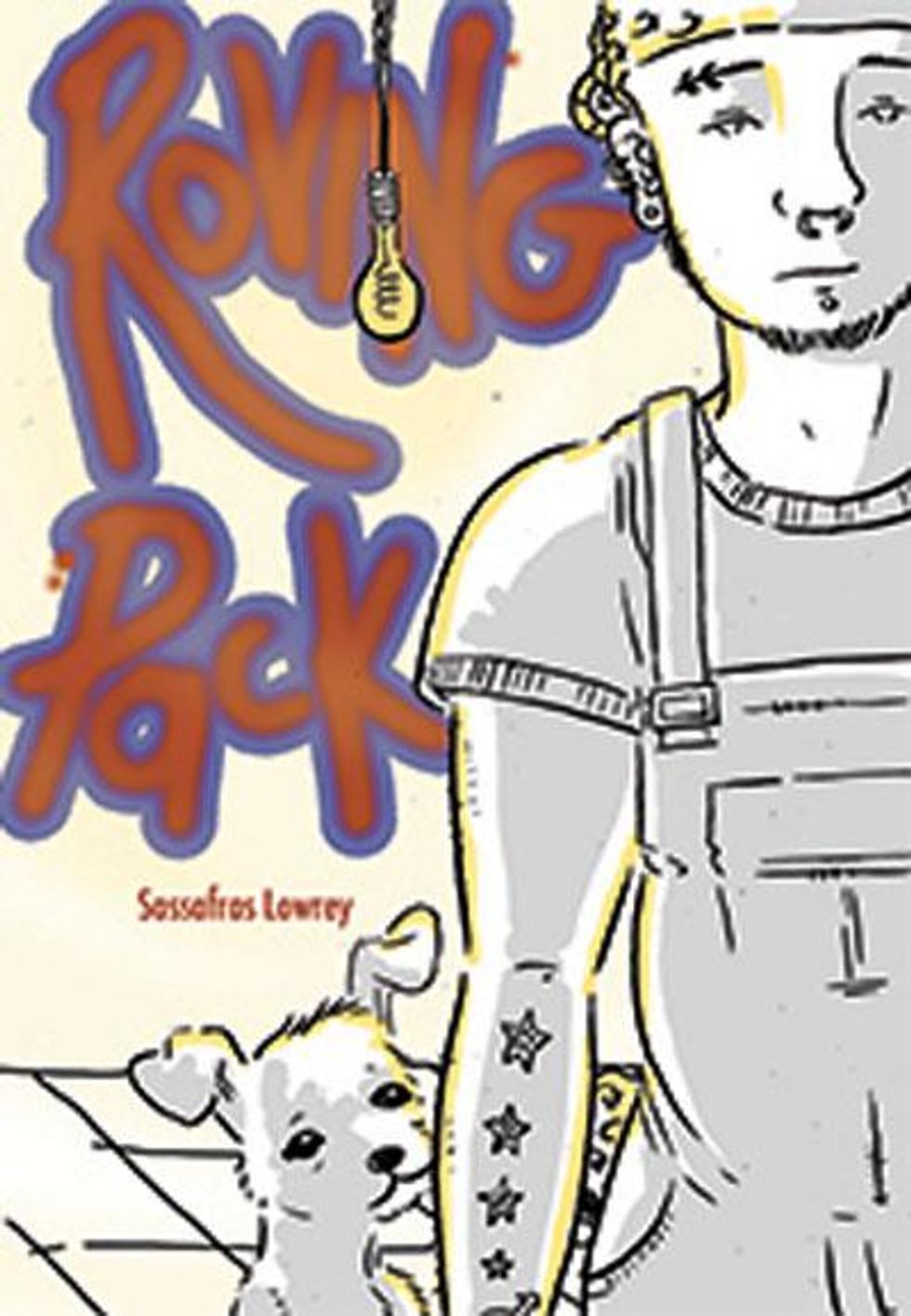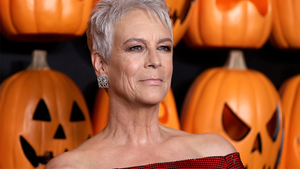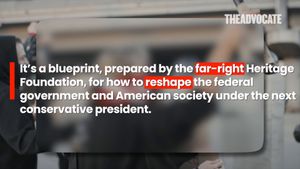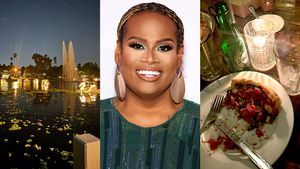Sycamore: As queer writers who make work that isn't considered part of the "mainstream," whether that be the straight or gay mainstream, often we're told that we have to justify our existence and explain how we got to this awfully strange place. In Roving Pack you dispense with those conventions in subtle ways. For example, the narrator, Click, talks about how it's weird to meet someone who isn't pierced or how it's bizarre when someone likes their parents. You bring us right into this world of transmasculine queer punk kids in Portland in the early 2000s -- you shift the center instead of speaking to an imagined mainstream.
Lowrey: I think for me it was about really wanting the work that I do to be within and for the communities that I come from, the communities that I'm in or have been in. I'm not going to hold your hand. I want this book to be with and for folks who spend so much of our time explaining ourselves and our lives and our worlds and our bodies to other people that we shouldn't have to do that in the books that we read. There can be this portrayal of our lives that doesn't have to apologize or explain or fall into the role of 101 community educator.
Sycamore: I actually think that people relate more when things aren't explicated in a very careful and cautious way, where instead you have to enter on the terms of the narrator or the characters or the writers and editors of a particular book.
Lowrey: Yeah exactly. I think that's why I've always resonated so much with your books and certainly with Why Are Faggots So Afraid of Faggots. Your work is so in-your-face. I mean just in the title, let alone once people get into it. It's a very similar connection of not being apologetic, which I feel sometimes that education moment becomes. Almost like "I'm so sorry my world is so confusing or weird here, let me help you figure it out."
Sycamore: Exactly. I see Why Are Faggots So Afraid of Faggots as an emergency intervention. Gay sexual/social culture has become obsessed with policing the borders rather than fluidity or experimentation or flamboyance or camaraderie. Things like "no femmes or fatties" or "HIV-negative only" or "no blacks or Asians" are unquestioned preferences in gay male cruising arenas. In some ways gay culture has become a refuge for really reactionary, backwards misogyny and femmephobia and body fascism and ageism and racism and all the most horrible things but they are deified and considered oh so hot and manly! With Why Are Faggots So Afraid of Faggots I want to investigate and explode those norms and also reinvoke the original visions of gay liberation, which were about an end to the nuclear family and organized religion and police control over queer bodies and lives. And also to explore the places where we fail.


Lowrey: Roving Pack is in many ways ultimately about the failure that we as queer folks, and as queer folks on the margins, do the best we can to take care of ourselves and one another and there's a lot of beauty and strength and survival in that. And then ultimately we often times fail each other too, and fail ourselves, and that was one of the themes that came out really early in Roving Pack that I hadn't anticipated: the failure of community and, paradoxically, community being the stronghold and the only thing you've got.
Sycamore: I think there's so much rhetoric in gay establishment circles or in LGBT nonprofit worlds around this kind of "shiny happy people" version of gay or LGBT or even queer success, and this camouflages a lot of violence and leaves a lot of people hopeless. In Why Are Faggots So Afraid of Faggots I really want to explore all these failures, whether personal or communal, in terms of negotiating safer sex or finding people you can relate to in prison or on the street while turning tricks or in bed with a new lover or while trying to avoid getting deported, all those intersections. We're never going to get anywhere if we can't explore and negotiate our contradictions with a raw sense of vulnerability.
Lowrey: Right! And nobody wants to hear that. We can pretend that we've got this stuff figured out and we're in this queer utopia and it's all wonderful. We can invent our own identities and create our lives, but it's also not nearly so perfect as I think many folks would like us to believe. I'm definitely bracing for people, especially some trans folks, to be very angry about the way in which I portray a trans character whose gender is not nearly settled and who has a lot of ongoing community pressure to settle somewhere. I think people get really uneasy, and that's one of the things I'm always so grateful for in your books, you call it like it is.
Sycamore: Yes, how do we get beyond the limitations of "It Gets Better" cheerleading to name and claim a faggotry that challenges norms of behavior rather than obsessing over them? In Roving Pack, the narrator Click decides to shoot testosterone because the person Click is dating, a trans fag, is uncomfortable with the possibility that other queers might think he's dating a lesbian. It's so brave that you're exploring places where peer pressure becomes internalized so that self-expression ends up becoming almost impossible or at least conflicted.

Lowrey: It's tricky -- you're talking about this gayness or queerness that started one way as very flamboyant and then has become normalized with all these rigid roles and boundaries. One of the things I wanted to do with this book was to ask what it means that so often our communities privilege certain bodies and experiences, like deciding what it means to be "really" trans. I think for me, as somebody who was on [testosterone] for three years and went off T and went back on T and then did go off T eventually, I'm really interested in exploring what the pressure to pass looks like, and that makes people in queer and trans communities really uncomfortable. I lost my whole community when I quit [testosterone] and so I know how present that fear is. That fear within our queer communities of not conforming to these worlds that we've created is so palpable for many, many of us.
Sycamore: It's so ironic -- the pressure to conform to the nonconformist dictate.
Lowrey: The best advice I got during the writing process was to "write the most dangerous book that you can imagine," and I did. And at the same time I didn't realize at the time quite how uncomfortable it was going to make people.
Sycamore: It's always interesting what people find controversial. I did an event for Why Are Faggots So Afraid of Faggots at the University of Southern California, and there was a big controversy before I arrived where one gay student in particular was very offended that I'd used "faggot" in the title and I doubt he'd read any of the book but according to him this could never be reclaimed speech because he had never met anyone who identified as a faggot. But I was never interested in a tamer title: the title actualizes what the book is invoking. It's leveling the playing field. And I think of course "faggot" is still used as a slur and as a word to keep people in their place, not just among straight homophobes but among straight-acting proper gay men, but honey, please, look in the mirror! I think as soon as something is toned down or streamlined or packaged to fit into a familiar narrative, it loses its potential for instigation and insight.
Lowrey: That messiness was one of the things I was so intent on keeping in Roving Pack. I didn't want someone to come away from the book feeling like it wrapped up in a nice little package and everyone lived happily ever after and it was clean and perfect. I wanted my readers to sit in that mess because that's what's real.
